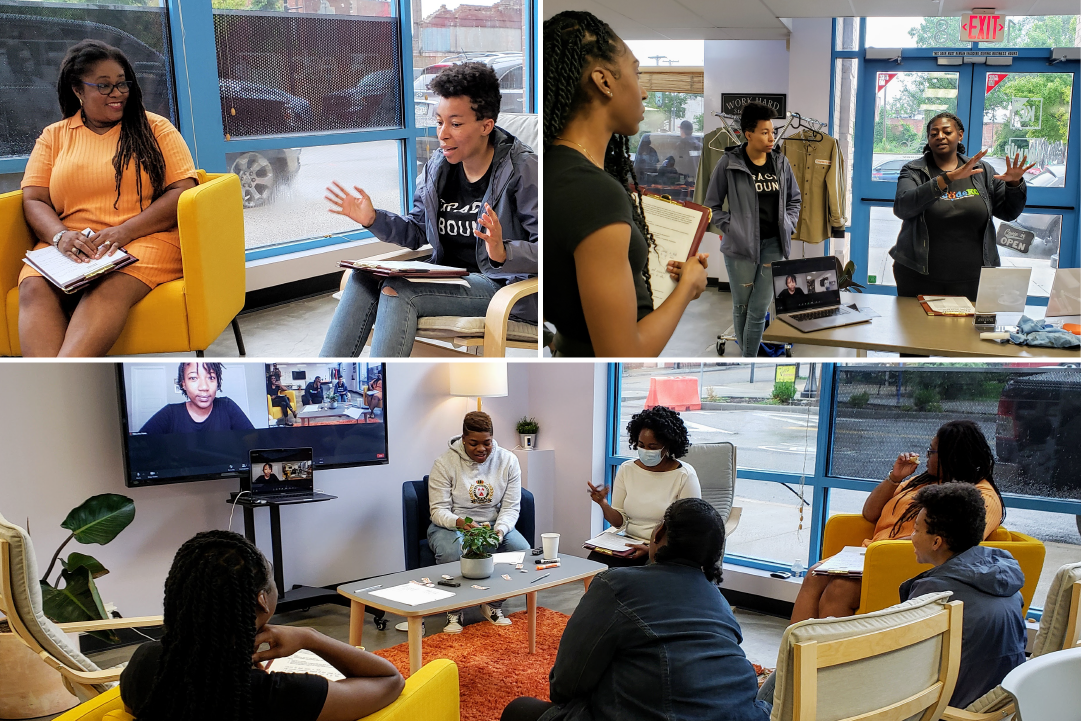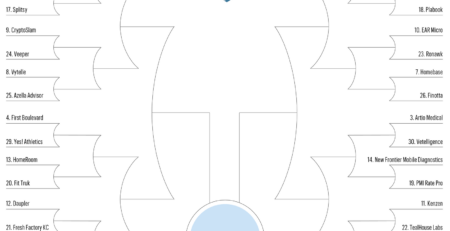3 Actionable Steps to Support KC’s Black Women in Tech
By Porcshe Moran Murphy
While Black women are launching businesses faster than any other racial group, they received only 0.34% of the total venture capital spent in the U.S. in the first half of 2021. When seeking capital, Black entrepreneurs are three times as likely to be turned down as their white peers in the same sector.
These types of statistics were top of mind when UMKC Innovation Center’s Technology Venture Studio and The Porter House KC brought together a small group of Black women tech founders last summer for Part 2 of a discussion around the current realities and future possibilities of being a Black woman tech entrepreneur in Kansas City. The initial conversation, co-hosted by The Porter House KC, Digital Sandbox KC and Square One Small Business Services by Mid-Continent Public Library, took place in November 2020 during Global Entrepreneurship Week.
The six tech founders — who run businesses focused on everything from telehealth to digital clothing measurements — shared practical insights on how KC can bolster its tech industry through better engagement and promotion of Black women. Adrienne B. Haynes, an attorney and business owner who specializes in helping entrepreneurs develop sustainable infrastructure and business practices, served as the session moderator.
“As Black women founders, unfortunately, the odds are against us being funded,” says Jannae Gammage, COO, Techquity Base. “We need to find someone who will put our business through the wringer, tell us what works and what doesn’t, and help us cultivate the skills that will make us successful founders. Then, once our business is packaged up nice and pretty, we need them to walk with us through the steps to get the money to actually launch it.”
Increase support and funding opportunities
From grants to pitch prizes, there are many ways to fund a business. Entrepreneurs need access to traditional and innovative funding models to find the most beneficial fit.
“It’s important for us to recognize that we might get funded or have a resource deposit that doesn’t look traditional,” says Jonaie Johnson, founder and CEO, Interplay. “In an ecosystem that’s well-supported, there are a lot of players that can come in and say, ‘Here’s another more flexible option to do business.’”
“In an ideal ecosystem, there should be multiple sources of funding,” Adrienne adds. “We could win a pitch prize or have equity that’s owned and shared by Black women. We could have an angel fund too. It’s not that all venture capital is bad, it’s just about the terms. As Black women creators and business owners, we should be able to say, ‘Those terms don’t work for me based on my three-year projection, and here’s what would be better for me.’”
Finding the right mentors who can offer significant guidance is recommended for every entrepreneur. It’s even more critical for Black women, who have to navigate racial and gender bias and inequality in addition to conventional business challenges.
“The issues that Black women in tech face are pervasive throughout every aspect of our lives,” Jannae says. “We’re underestimated and have to fight preconceived notions every day. I’ve had people speak to me in ways that I know they wouldn’t speak to men or to white women.”
There are many opportunities and resources available for tech entrepreneurs in Kansas City, but Black women and other underrepresented people can find it difficult to make valuable connections if they’re not embedded in an academic or corporate environment. For example, Jonaie explained that her status as a UMKC student who has participated in the Regnier Institute’s Entrepreneurship Scholars Program was the only reason she knew about the support avenues for startups.
According to Jannae, there’s a lack of knowledge in the general public about the financial and educational resources that are available.
“The way the entrepreneurial community is set up right now, if you don’t already know someone who can at least start you down the right path, you won’t know where to go.”
Create more entry points and close pipeline gaps
Youth programs that encourage tech immersion at an early age are another way to improve accessibility. For example, Tammy Buckner’s WeCodeKC initiative gives children in Kansas City’s urban core the chance to learn the programming, coding, technology concepts and leadership skills that will prepare them for a range of future careers.
“When I was younger, I had no idea what a tech startup or a tech founder was, and I had no idea that I could start a tech company,” says Tammy, who is also CEO of Techquity Base and COO/Co- founder of PlaBook. “I’m so thankful for all of the volunteers and mentors that work with our youth. These kids are smart, and they catch on so quickly.”
Networking is key to getting plugged into resources. Entrepreneurs should invite Black women to tech-related conferences, happy hours, peer-to-peer roundtables and pitch competitions. They can also reach out and facilitate meaningful interactions through social media channels like LinkedIn and Clubhouse. Co-working spaces are ideal for meeting like-minded professionals and these community hubs can be even better with inclusive practices like flexible hours and on-site childcare.
Lastly, entrepreneurs can help bridge the pipeline gaps for underrepresented groups by openly sharing their knowledge of effective business and career pathways.
“Sometimes it’s like a secret club where nobody is telling you about the resources until you earn your stripes, and then they unlock the door to all this stuff you never knew existed,” says Dr. Shelley Cooper, CEO and founder, Diversity Telehealth. “It shouldn’t be that way, but to figure out what’s going on and what’s available, you have to join organizations, get involved as much as possible and dig for information.”
Amplify Black voices and stories
Black women need genuine relationships with advisors who are willing to provide what Felecia Hatcher, CEO, Black Ambition, calls “intentional support.” For instance, she says an excellent mentor will make introductions and tee up conversations that make it easier to build relevant professional connections. They should also be willing to assist with securing jobs or landing funding to accelerate your ideas.
“We can challenge people to not only be better allies, but also to be co-conspirators and accomplices,” says Felecia. “That means they’re standing right beside you as a Black woman and not just on the sidelines.”
Other helpful actions include pitching Black women leaders for media coverage, creating an equitable hiring funnel that opens the door to more Black women in leadership roles, and developing or hosting programming to get honest, ongoing and clear feedback on Black women’s entrepreneurship experiences.
“We need advocates because there are going to be people out there going against us,” Tammy says. “We need a champion that’s speaking on our behalf, even when we’re not at the table.”
Upcoming Opportunities
The Technology Venture Studio at UMKC and The Porter House Kansas City are committed to hosting ongoing conversations and activities to drive these recommendations forward. Those with ideas are encouraged to reach out to [email protected].
Digital Sandbox KC is accepting new applications for its second-quarter 2022 cycle and presentations: Submit an idea at digitalsandboxkc.com/submit-idea.
Comeback KC Ventures is accepting ideas for innovations that are being developed in response to COVID-19: Learn how you can participate at kcdigitaldrive.org/project/comeback-kc-ventures/
The Porter House Kansas City’s Alchemy Sandbox is accepting applicants until November 2022 for its program that provides critical funding, mentoring and connections to help founders build viable businesses: theporterhousekc.com/alchemy-sandbox-program





